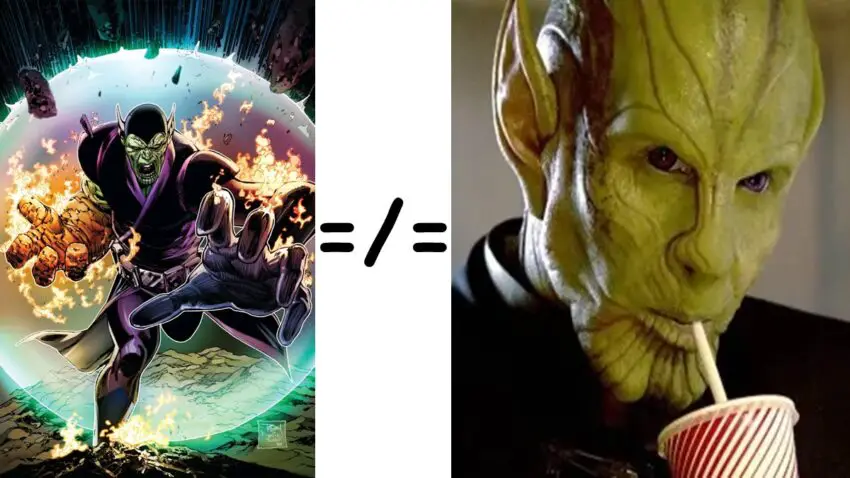The Skrulls are coming! The Skrulls are Coming!
Well, technically, they’re already here and have been for a long time, but nobody seems to care all that much.
If you have no idea what I’m talking about, as of this writing, we’re halfway through the first (only?) season of the MCU’s take on Secret Invasion, focusing on a Skrull takeover of Earth.
Predictably, the critical reception is mixed to negative, matching the sentiments of yours truly. There are multiple flaws with the show but chief among them is the number of creative liberties taken with the source material and how those liberties turn what could have been a tight, psychological, spy thriller into a mediocre ride.
When you hear the more shill-prone pundits and MCU superfans claim confusion over comic fans disliking the changes, there’s a key aspect those pundits miss because it makes all the difference in the world.
That aspect is wasted potential.

To make the case, let’s take a quick look at what the Skrulls originally represented, how they’re presented now, and the negative effect on storytelling the difference between the two created.
The Skrulls first appeared in Fantastic Four #2 (1961) as a race of shapeshifting aliens engaged in ongoing hostilities with the Kree. The Skrulls intended to invade Earth by first turning the world against the Fantastic Four, using their shapeshifting powers to convince the public the FF had turned evil. With the heroes out of the way, the Skrulls had an obstacle-free path to invasion.
As a real-world allegory, the Skrulls borrowed heavily from the anti-Communist sentiment of the 50s and 60s. The public could relate to the idea of your enemy being your neighbor without you knowing it, so the story hit a natural chord, built on the specter of paranoia and enemies hiding in plain sight.
Subsequently, the comic version of the Secret Invasion storyline built on that paranoia by showing the Skrulls infiltrating high levels of government and even replacing respected superheroes to stage a worldwide takeover. Secret Invasion was a hit, spawning multiple comic sequels, and now, a Disney+ series.
Where did it go wrong?
When the Skrulls made their big film debut in Captain Marvel (2019), the creators decided to downplay the paranoia aspects in favor of portraying the Skrulls as homeless innocents looking for safe harbor. In other words, the creators jettisoned the paranoia template that worked for decades and used the Skrulls to create a refugee allegory… with a little shapeshifting on the side.
The heightened sense of paranoia? Gone. The tension that comes with the shocking realization that your enemy is next to you, and you didn’t know it? Dissipated. The foundation needed to set the stage for the Skrulls to invade Earth through trickery and deception? Weak and crumbling.
As a Marvel fan, you can see the Skrulls’ path from A to B to C in terms of storylines and big events. When Hollywood writers make changes to suit their own tastes or to match whatever social topic du jour is happening, the path breaks.
In the Disney+ version of Secret Invasion, there’s no way to restore the Skrulls to their paranoia-inducing comic roots without twisting the reworked premise in a way that demonizes refugees. The writers are forced to invent a weak premise about a terrorist faction of Skrulls rising up because Nick Fury took too long to find them a permanent home. In short, the writers expect viewers to believe that the Skrulls feel justified in committing genocide because they’re “impatient”?!?
Much of the online comics discourse that gets contentious usually centers on race and gender swaps, but in reality, the true damage, whether swapping characters or storylines, comes down to wasted potential.
You’ll never get a serious, badass Thor movie because the last few films portrayed him as a comic-relief meathead.
You’ll never see Monica Rambeau assume her favorable role as leader of the Avengers (the one she held for many years in the comics) because she’s been relegated to a side character who only got her powers recently through an ill-defined accident in the WandaVision series.
And you’ll never see the Skrulls portrayed as a threat worthy of the Avengers or the Fantastic Four because they’ve been set up as immigrants with an unfair grudge.
When Holywood makes changes, without respecting the lore, the subsequent storylines that have worked and persisted over decades become null and void. Pushback to swaps and changes isn’t always about “disliking change.” Sometimes it’s about not wasting potential.
We hope you found this article interesting. Come back for more reviews, previews, and opinions on comics, and don’t forget to follow us on social media:
If you’re interested in this creator’s works, remember to let your Local Comic Shop know to find more of their work for you. They would appreciate the call, and so would we.
Click here to find your Local Comic Shop: www.ComicShopLocator.com
As an Amazon Associate, we earn revenue from qualifying purchases to help fund this site. Links to Blu-Rays, DVDs, Books, Movies, and more contained in this article are affiliate links. Please consider purchasing if you find something interesting, and thank you for your support.

